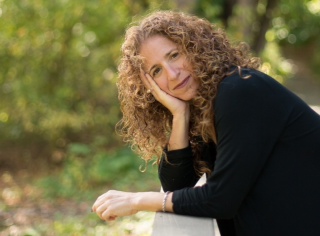 Deborah Greenstein
Deborah Greenstein is the CUNY LEADS Advisor at Bronx Community College. Previously, she worked as a Disability Counselor and the Coordinator for Interpreting Services at Hunter College. She holds a BA in History and an MA in International Affairs-National Defense Policy and is currently working towards an MA in Disability Studies through the CUNY School of Professional Studies.
Her research interests include two distinct populations: veterans with service-connected disabilities in higher education and elite athletes with disabilities and the role they play within the disability community. This summer she will be presenting at the Fifth Annual Sports & Society Conference in Rio de Janeiro, Brazil on the topic “Athletes with Disabilities: Where does Empowerment End and Disempowerment Begin?” The corresponding paper will be published post-conference.
Among Deborah’s roles with the Office of DisAbility Services is that she serves as a point-of-contact person for the Office of Veteran and Military Resources on campus. Through consistent contact with the veterans and military personnel, particularly veterans with service-connected disabilities, she began investigating best practices for colleges in assisting those returning from combat in their transition to a college campus.
Click here to go back
Deborah Greenstein
Deborah Greenstein is the CUNY LEADS Advisor at Bronx Community College. Previously, she worked as a Disability Counselor and the Coordinator for Interpreting Services at Hunter College. She holds a BA in History and an MA in International Affairs-National Defense Policy and is currently working towards an MA in Disability Studies through the CUNY School of Professional Studies.
Her research interests include two distinct populations: veterans with service-connected disabilities in higher education and elite athletes with disabilities and the role they play within the disability community. This summer she will be presenting at the Fifth Annual Sports & Society Conference in Rio de Janeiro, Brazil on the topic “Athletes with Disabilities: Where does Empowerment End and Disempowerment Begin?” The corresponding paper will be published post-conference.
Among Deborah’s roles with the Office of DisAbility Services is that she serves as a point-of-contact person for the Office of Veteran and Military Resources on campus. Through consistent contact with the veterans and military personnel, particularly veterans with service-connected disabilities, she began investigating best practices for colleges in assisting those returning from combat in their transition to a college campus.
Click here to go back From Combat to Campus: Easing the Transition for Veterans with Service-Related Disabilities
Deborah Greenstein, CUNY LEADS Advisor, Bronx Community College
Approximately two million veterans will be returning from duty in Iraq and Afghanistan over the next few years. It is predicted that 712,800-840,000 will apply for disability benefits. Many of the returning veterans will be taking advantage of the vast educational benefits available under the Post-9/11 Veterans Assistance Act of 2008 (known as the Post-9/11 GI Bill.) It is estimated that 20% of those returning veterans will have post-traumatic stress disorder (PTSD) and 19% will have suffered a traumatic brain injury (TBI) Some studies estimate that 40% of veterans retuning to higher education have some form of disability (i.e. PTSD, TBI, depression, substance abuse, hearing or vision issues, mobility limitations, burns and toxic exposure.) Beyond learning to live with service-related disabilities, these veterans will face a number of challenges in transitioning to both civilian life as well as to postsecondary environments. Once they arrive on campus and register for classes, they will need to adjust to academic expectations within the classroom. Should they choose to identify themselves as having a disability, they will defy some of the “typical” profiles of students with disabilities and will need accommodations specific to their experience and service-related injuries. This presentation will discuss suggestions academic literature has provided as to best practices towards which post-secondary institutions should strive.
Bio
 Deborah Greenstein
Deborah Greenstein is the CUNY LEADS Advisor at Bronx Community College. Previously, she worked as a Disability Counselor and the Coordinator for Interpreting Services at Hunter College. She holds a BA in History and an MA in International Affairs-National Defense Policy and is currently working towards an MA in Disability Studies through the CUNY School of Professional Studies.
Her research interests include two distinct populations: veterans with service-connected disabilities in higher education and elite athletes with disabilities and the role they play within the disability community. This summer she will be presenting at the Fifth Annual Sports & Society Conference in Rio de Janeiro, Brazil on the topic “Athletes with Disabilities: Where does Empowerment End and Disempowerment Begin?” The corresponding paper will be published post-conference.
Among Deborah’s roles with the Office of DisAbility Services is that she serves as a point-of-contact person for the Office of Veteran and Military Resources on campus. Through consistent contact with the veterans and military personnel, particularly veterans with service-connected disabilities, she began investigating best practices for colleges in assisting those returning from combat in their transition to a college campus.
Click here to go back
Deborah Greenstein
Deborah Greenstein is the CUNY LEADS Advisor at Bronx Community College. Previously, she worked as a Disability Counselor and the Coordinator for Interpreting Services at Hunter College. She holds a BA in History and an MA in International Affairs-National Defense Policy and is currently working towards an MA in Disability Studies through the CUNY School of Professional Studies.
Her research interests include two distinct populations: veterans with service-connected disabilities in higher education and elite athletes with disabilities and the role they play within the disability community. This summer she will be presenting at the Fifth Annual Sports & Society Conference in Rio de Janeiro, Brazil on the topic “Athletes with Disabilities: Where does Empowerment End and Disempowerment Begin?” The corresponding paper will be published post-conference.
Among Deborah’s roles with the Office of DisAbility Services is that she serves as a point-of-contact person for the Office of Veteran and Military Resources on campus. Through consistent contact with the veterans and military personnel, particularly veterans with service-connected disabilities, she began investigating best practices for colleges in assisting those returning from combat in their transition to a college campus.
Click here to go back
 Deborah Greenstein
Deborah Greenstein is the CUNY LEADS Advisor at Bronx Community College. Previously, she worked as a Disability Counselor and the Coordinator for Interpreting Services at Hunter College. She holds a BA in History and an MA in International Affairs-National Defense Policy and is currently working towards an MA in Disability Studies through the CUNY School of Professional Studies.
Her research interests include two distinct populations: veterans with service-connected disabilities in higher education and elite athletes with disabilities and the role they play within the disability community. This summer she will be presenting at the Fifth Annual Sports & Society Conference in Rio de Janeiro, Brazil on the topic “Athletes with Disabilities: Where does Empowerment End and Disempowerment Begin?” The corresponding paper will be published post-conference.
Among Deborah’s roles with the Office of DisAbility Services is that she serves as a point-of-contact person for the Office of Veteran and Military Resources on campus. Through consistent contact with the veterans and military personnel, particularly veterans with service-connected disabilities, she began investigating best practices for colleges in assisting those returning from combat in their transition to a college campus.
Click here to go back
Deborah Greenstein
Deborah Greenstein is the CUNY LEADS Advisor at Bronx Community College. Previously, she worked as a Disability Counselor and the Coordinator for Interpreting Services at Hunter College. She holds a BA in History and an MA in International Affairs-National Defense Policy and is currently working towards an MA in Disability Studies through the CUNY School of Professional Studies.
Her research interests include two distinct populations: veterans with service-connected disabilities in higher education and elite athletes with disabilities and the role they play within the disability community. This summer she will be presenting at the Fifth Annual Sports & Society Conference in Rio de Janeiro, Brazil on the topic “Athletes with Disabilities: Where does Empowerment End and Disempowerment Begin?” The corresponding paper will be published post-conference.
Among Deborah’s roles with the Office of DisAbility Services is that she serves as a point-of-contact person for the Office of Veteran and Military Resources on campus. Through consistent contact with the veterans and military personnel, particularly veterans with service-connected disabilities, she began investigating best practices for colleges in assisting those returning from combat in their transition to a college campus.
Click here to go back 